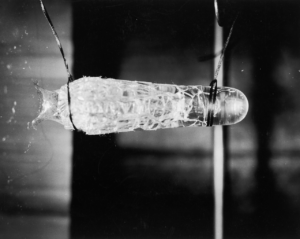Nei compagni anarchici c’è un rapporto ambivalente con il problema dell’organizzazione.
Ai due estremi si collocano l’accettazione della struttura permanente, dotata di un programma ben delineato, con mezzi a disposizione (anche se pochi) e suddivisa in commissioni; e, dall’altro lato, il rifiuto di ogni rapporto stabile e strutturato anche nel breve periodo.
Le federazioni anarchiche classiche (vecchia e nuova maniera) e gli individualisti, costituiscono i due estremi di qualcosa che cerca comunque di sfuggire alla realtà dello scontro. Il compagno aderente alle strutture organizzate spera che dalla crescita quantitativa venga fuori una modificazione rivoluzionaria della realtà, per cui si concede l’illusione a buon mercato di controllare ogni involuzione autoritaria della struttura e ogni concessione alla logica del partito. Il compagno individualista è geloso del proprio io e teme ogni forma di contaminazione, ogni concessione agli altri, ogni collaborazione attiva, pensando queste cose come cedimenti e compromessi.
Continue reading Affinità Alfredo M. Bonanno
Tag Archives: Anarchismo Giornale
Tal para cual. Reseña y reflexiones sobre “Colpo su colpo”, acerca de la acción del compañero Émile Henry.

Artículo aparecido en la revista Anarchismo número 23-24 (1978) que analiza el libro “Colpo su colpo”, editado por Edizioni Vulcano el mismo año.
Una colección contiene una biografía de Henry, dos de sus cartas, el reporte del proceso, algunos aforismos, y un apéndice con una interesante carta de Malatesta y una inútil correspondencia tomada de “Le Petit Journal”.
El volumen, hay que decirlo, presenta un problema que supera de gran manera los estúpidos logros tanto de los historiadores clásicos como de los historiadores del anarquismo: el gesto de Henry fue algo que miedo, fue algo que sacudió no sólo a la llamada “opinión pública”, sino que también a los compañeros. Y la carta de Malatesta, inserta en el apéndice, es un ejemplo de esta perplejidad tomada por el anarquista italiano y justificada, en cierto modo, poniendo por delante la usual cautela, la misma que pocos años antes había hecho gritar “provocador” a gente como Grave o como Kropotkin en las confrontaciones sobre Ravachol.
Continue reading Tal para cual. Reseña y reflexiones sobre “Colpo su colpo”, acerca de la acción del compañero Émile Henry.
Affinità (it/en/de)
Alfredo M. Bonanno
Nei compagni anarchici c’è un rapporto ambivalente con il problema dell’organizzazione.
Ai due estremi si collocano l’accettazione della struttura permanente, dotata di un programma ben delineato, con mezzi a disposizione (anche se pochi) e suddivisa in commissioni; e, dall’altro lato, il rifiuto di ogni rapporto stabile e strutturato anche nel breve periodo.
After Marx, autonomy
A.M. Bonanno
Original title: Alfredo M. Bonanno, Autonomia dei nuclei produttivi di base Anarchismo n. 3, 1975
The road ahead of the proletariat is blocked: the reformist parties, trade unions and employers have coalesced to obstruct any growth in the level of the struggle, or any conquests that could lead to a revolutionary transformation of production relations.
The proletariat have only one alternative: that of building communism directly, passing over the counterrevolutionary bureaucratic structures. In order to do this we must provide analyses of and realise in practice, elements organised by the base at the level of production: autonomous workers’ nuclei.
Continue reading After Marx, autonomy
1980 WHY A FRAME UP
June 30 saw the release of Alfredo Bonanno and Jean Weir after 100 day’s detention, leaving in prison leaving only one of the original 19 anarchist comrades arrested in the ‘blitz’ operation carried out by various sectors of the Italian police in Sicily and North Italy at the end of March. The comrade still in prison (now in the ‘special’ prison Fossombrone in Pesaro) is Massimo Gaspari, sentenced to 4 years 10 months for possession of explosives after 50 sticks of gelignite were found in his home.
Continue reading 1980 WHY A FRAME UP
1980 FRAME UP AGAINST ANARCHISTS IN ITALY
In coming out of the realms of such sweeping statements as can be found in most anarchist. Literature i.e. “we must destroy the State”, into the particular identification of the State in its instruments of repression: “the police, the judiciary, the bosses”, Alfredo Bonanno is giving a precise indication of the imperative of today. And so the State retaliates – all forms of opposition to its persistence must be silenced.
Continue reading 1980 FRAME UP AGAINST ANARCHISTS IN ITALY
1978 THE POLICE AND JUDICIARY OF THE HISTORIC COMPROMISE INCRIMINATE A NINETEENTH CENTURY CLASSIC
While the criminals responsible for the destruction of Seveso freely continue to destroy the lives of thousands of proletarians
While those responsible for the Lockheed scandal are tranquilly carrying on governing and organising swindles
While the Andreotti/Berlinguer government pillages the low wages of the exploited and forces millions of them into unemployment and emargination
Continue reading 1978 THE POLICE AND JUDICIARY OF THE HISTORIC COMPROMISE INCRIMINATE A NINETEENTH CENTURY CLASSIC
CLASS WAR
In Italy there is a civil war in course. Just as in every other part of the world, the mortal clash has well defined characteristics in relation to the conditions of exploitation imposed by the dominant class. That is why we are speaking of class (civil) war.
State violence and defensive class violence are opposing each other in a clash that only the politically short-sighted insist on not seeing. The terrorism of the various organisations in the service of the bosses is a constantly detectable element, just as in the other field, an organisation of defence is beginning to take shape aagainst the State assassins, organisations that should be examined and evaluated in their limits and perspectives.
Continue reading CLASS WAR
Le lotte di classe in Iran
«Théorie communiste» (1979)
[Il testo che qui pubblichiamo è apparso in traduzione italiana sulla rivista «Anarchismo», serie I, n. 26-27, 1979]
[…] La necessità per il movimento teorico di analizzare lo sviluppo concreto e talvolta persino puntuale della crisi, risiede nel fatto che non v’è superamento del capitale che sia dato nell’essenza di una classe, che sia il risultato di un processo teleologico. Il superamento del capitale non è cosa diversa dalle condizioni qualitative del rapporto tra le classi che formano lo svolgimento della crisi.
Continue reading Le lotte di classe in Iran
Lightening Conductors and Stand-ins
Anarchismo Collective
“The cleavage of men into actor and spectators is the central fact of our time. We are obsessed with heroes who live for us and whom we punish. If all the radios and televisions were deprived of their sources of power, all books and …. One is spectacle. Like the Phantasmagoria, its goal is the creation of a total …” (Jim Morrison).
Continue reading Lightening Conductors and Stand-ins








